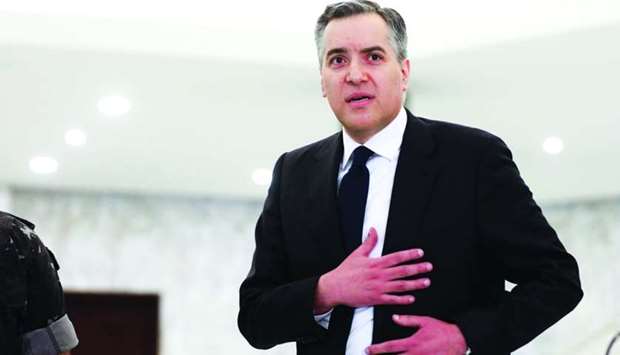Lebanon's premier-designate stepped down Saturday, saying he had been unable to form a reform-minded government to lift the country out of its worst economic crisis in decades.
Lebanon's last government resigned in the aftermath of a colossal blast at Beirut's port on August 4 that killed more than 190 people, wounded thousands and ravaged swathes of the capital.
Since his nomination on August 31, Mustapha Adib has been under pressure to form a new cabinet as soon as possible to carry out the necessary reforms to unlock billions of dollars in foreign aid.
"I excuse myself from continuing the task of forming the government," Adib said in a televised speech.
"I apologise to the Lebanese people... for my inability to realise their aspirations for a reformist team," he said.
Government formation can drag on for months in multi-confessional Lebanon, where a power-sharing agreement seeks to maintain a fragile balance between all sides.
This means in practice that all main political parties must agree on major decisions, including the makeup of any future cabinet even before it is submitted for parliamentary approval.
Adib's efforts to come up with a new line-up have been effectively blocked by the main parties representing Lebanon's large Shiite community -- Amal and Hezbollah.
The two parties have refused to budge on their demand to keep the finance ministry under their control.
Adib, a little-known 48-year-old former ambassador, was named just hours before French President Emmanuel Macron made his second visit to the country since the August 4 blast, pressing for the speedy formation of a reformist government.
Macron said he had secured commitments from all of Lebanon's political parties to help Adib achieve that within a fortnight, but the deadline came and went.
The French presidency said Macron would hold a news conference to address the latest Lebanese crisis today.
Adib said he failed to win the support of all political forces.
"As the efforts to form a government reached their final phase, it became apparent to me that this consensus... was no longer there and that forming one according to the criteria I had determined was bound to fail."
Even before last month's blast, Lebanon was already mired in its worst economic crunch since the 1975-1990 civil war, as it grappled with the novel coronavirus pandemic.
Adib has become the third prime minister, or prime minister-designate, to step down in less than a year.
Former prime minister Saad Hariri -- who quit in October during massive protests -- lamented the deadlock that led to Adib's resignation.
"You will bite your fingers in regret... over wasting an exceptional opportunity that will be difficult to repeat to stop the economic collapse and put the country on the path of demanded reform," Hariri said.
UN envoy to Lebanon Jan Kubis reacted on Twitter: "Such a degree of irresponsibility, when the fate of Lebanon and its people is at stake!"
"Politicians, have you really scuppered this unique chance created by France?"
Since his nomination on August 31, Mustapha Adib has been under pressure to form a new cabinet as soon as possible to carry out the necessary reforms to unlock billions of dollars in foreign aid.
"I excuse myself from continuing the task of forming the government," Adib said in a televised speech.
"I apologise to the Lebanese people... for my inability to realise their aspirations for a reformist team," he said.
Government formation can drag on for months in multi-confessional Lebanon, where a power-sharing agreement seeks to maintain a fragile balance between all sides.
This means in practice that all main political parties must agree on major decisions, including the makeup of any future cabinet even before it is submitted for parliamentary approval.
Adib's efforts to come up with a new line-up have been effectively blocked by the main parties representing Lebanon's large Shiite community -- Amal and Hezbollah.
The two parties have refused to budge on their demand to keep the finance ministry under their control.
Adib, a little-known 48-year-old former ambassador, was named just hours before French President Emmanuel Macron made his second visit to the country since the August 4 blast, pressing for the speedy formation of a reformist government.
Macron said he had secured commitments from all of Lebanon's political parties to help Adib achieve that within a fortnight, but the deadline came and went.
The French presidency said Macron would hold a news conference to address the latest Lebanese crisis today.
Adib said he failed to win the support of all political forces.
"As the efforts to form a government reached their final phase, it became apparent to me that this consensus... was no longer there and that forming one according to the criteria I had determined was bound to fail."
Even before last month's blast, Lebanon was already mired in its worst economic crunch since the 1975-1990 civil war, as it grappled with the novel coronavirus pandemic.
Adib has become the third prime minister, or prime minister-designate, to step down in less than a year.
Former prime minister Saad Hariri -- who quit in October during massive protests -- lamented the deadlock that led to Adib's resignation.
"You will bite your fingers in regret... over wasting an exceptional opportunity that will be difficult to repeat to stop the economic collapse and put the country on the path of demanded reform," Hariri said.
UN envoy to Lebanon Jan Kubis reacted on Twitter: "Such a degree of irresponsibility, when the fate of Lebanon and its people is at stake!"
"Politicians, have you really scuppered this unique chance created by France?"

